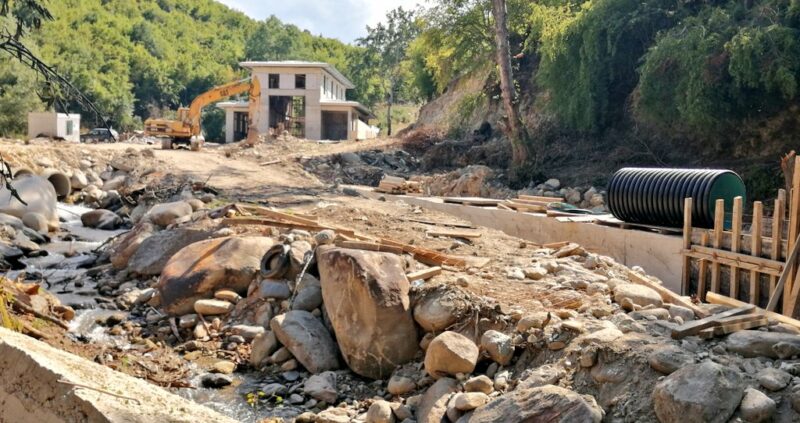Small hydro plants construction also hinders access to drinking water
Originally published on Global Voices

Construction site of a small hydro plant on Markova Reka, near Skopje, North Macedonia. Photo from private archive, used with permission.
This story is based on reporting by Meta.mk. An edited version is republished here through a content-sharing agreement between Global Voices and Metamorphosis Foundation.
Nearly one year after officials announced they would construct a new national park in North Macedonia, its natural environment is still under siege, as businesses seek to develop parts of the park and leverage the land for capital gains. Before the land was converted to a national park, the government offered buisnesses concessions and subsidies to build and operate small hydro plants that appropriate the water from mountain springs.
Now that plans for the park are underway, the buisnesses are refusing to give up their lucrative ventures.
Within the confines of the new Shar Mountain National Park in North Macedonia, 11 micro hydro power plants have been built and are in use, and four more are under construction.
On June 30, 2021, the Parliament of the Republic of North Macedonia adopted a law proclaiming part of the Shar Mountains a national park, covering 2 percent of country's land mass, including 28 lakes and many other natural resources. Its population of 26,000 is spread across 30 villages.
The natural environment across the Balkans is under serious threat from the construction of over 2,700 small hydro plants, which has been subsidized by various state governments. Critics say construction is rushed without proper environmental impact assessment, and that the projects are mired in corruption.
In 2021, government representatives claimed they would seek to stop the construction and remove the small hydro plants from the newly established Shar Planina National Park. However, the developers are not giving up without a fight.
The developers are effectively holding the land hostage, as some micro hydro power plants operators have refused to halt construction unless the government reimburses their invested assets.
During the ongoing negotiations with the government, only one concessionaire, controlling two micro hydro power plants, has withdrawn entirely and is not requesting compensation.
The Ministry for Environment and Physical Planning of North Macedonia has not revealed the amounts requested by the developers. Their representatives stated that the Park Commission consisting of members of the ministries of the environment, finance, and economy are still analyzing the requests and the evidence, and are still negotiating with the hydro plant operators.
The Ministry of Environment has only informed the public about the subject of negotiations:
At the moment, the negotiations with all concessionaires are underway that are encompassed by Article 17 of the Law on declaring a part of Shar Mountain a protected area of the second category, a national park with established temporary protective areas. These are MHEC Pena 82, MHEC Ljubotenska 66, MHEC Vratnichka 67, MHEC Belovishka 107, MHEC Mazdracha, and MHEC Leshochka 100 and 101.
Out of these, the concessionaire of Leshochka 100 and 101 small hydro plants has filed a statement that is withdrawing from investments without requesting any reimbursement while concessions for Pena 82, Ljubotenska 66, Vratnichka 67 and Belovishka 107 have filed a request for reimbursement of assets for the contract performance up to this moment.

A construction of small hydro plants on Shar Mountain in 2021. Photo by Portalb.mk, used with permission.
Environmental civic organizations have been pushing the government to halt these energy facilities for a long time. The reasons include the obvious destruction of nature and the damage to biodiversity, as the plants usually funnel water from streams and rivers into pipes, creating artificial drought for the surrounding areas, leading to deforestation and desertification.
Small hydro plants construction also hinders access to water for human inhabitants in the nearby areas. For instance, the city of Tetovo, situated next to Shar Planina National Park, had been facing regular drinking water shortages.
Moreover, a 2021 analysis by the Center for Economic Analysis (CEA) and environmental organization Eko Svest (“Eco Consciousness”) revealed that the whole framework for state subsidies for small hydro plants is not in line with European Union regulations, which hinders the country's strategic goal for joining the EU.
On the other hand, the small hydro plats provide a minimal contribution to the supply of electricity of the country, not more than five to seven percent.
In a statement to Meta.mk, Gjorgji Mitrevski, an Eko Svest representative, stressed that the environmentalists are expecting the Berne convention’s recommendations to be obeyed.
It is expected that the the country signatory of the Bern Convention for biodiversity protection to implement the recommendations in the national legislation. We are having constant communication with the Convention and from the moment the recommendations have passed until now, there hasn’t been any activity.
Mitrevski noted that several months ago the Bern Convention recommended avoiding building hydro-power plants in protected areas. Similar demands had been issued in 2015 and 2017 in regard to another national park in North Macedonia, Mavrovo. There is also a standing recommendation that energy facilities not be built anywhere outside of protected areas if their building will have an effect on protected areas. Mitrevski stressed that this clearly indicates all planned facilities in the national parks must not be built and those outside have to be revised.
The final decision for compensating the concessionaire will have to be made by the Government of Republic of North Macedonia, said the Ministry of Environment in a statement for Meta.mk.

Panorama of the village of Bozovce, within the confines of the Shar Planina National Park in North Macedonia. Photo by Meta.mk, used with permission.
Post a Comment